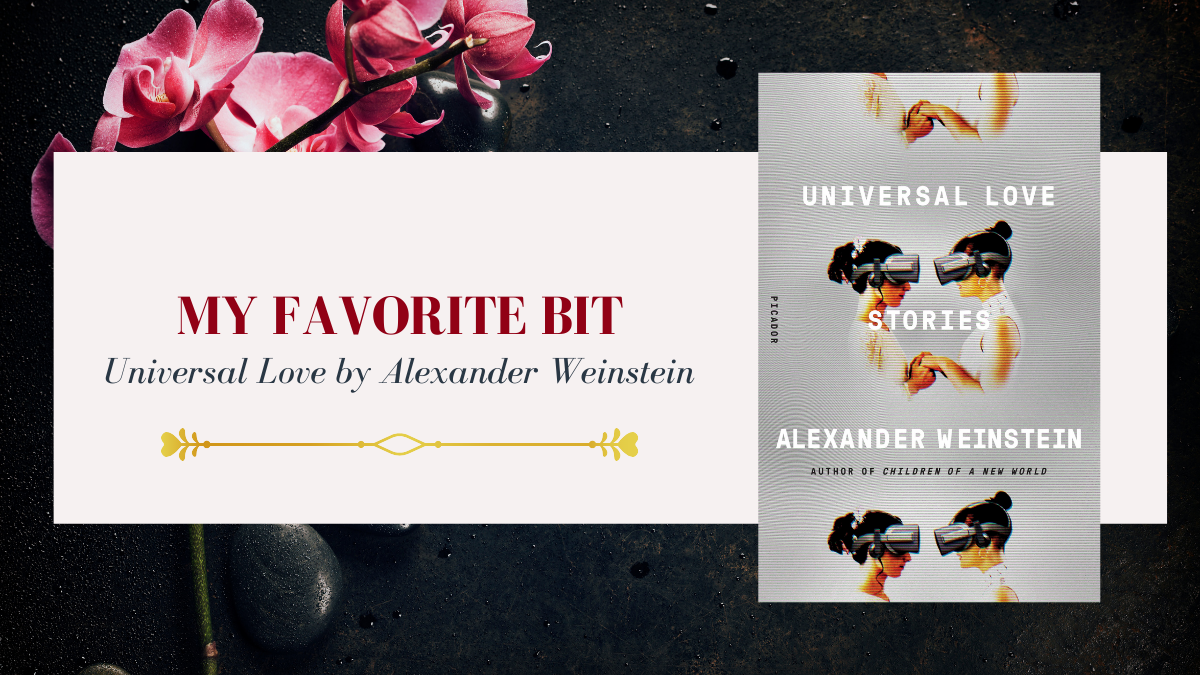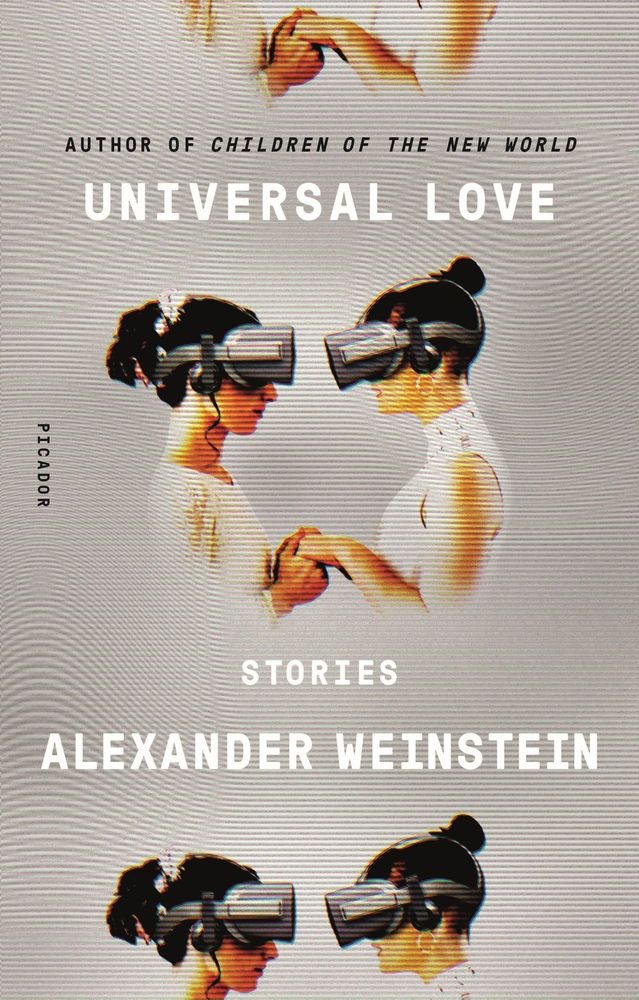
Alexander Weinstein is joining us today to talk about his short story collection, Universal Love. Here’s the publisher’s description:
A hypnotic collection of speculative fiction about compassion, love, and human resilience in the technological hyper-age, from Alexander Weinstein, author of Children of the New World.
Universal Love welcomes readers to a near-future world where our everyday technologies have fundamentally altered the possibilities and limits of how we love one another. In these gripping stories, a young boy tries to understand what keeps his father tethered to the drowned city they call home. A daughter gets to know her dead mother’s hologram better than she ever knew her living mother. And, at a time when unpleasant memories can be erased, a man undergoes electronic surgery to have his depression, and his past, forever removed.In an age when technology offers the easiest cures for loneliness, the characters within these stories must wrestle with what it means to stay human in an increasingly cybernetic future, and how love can endure even the most alluring upgrades.
In the vein of Weinstein’s critically-acclaimed first collection, Universal Love is a visionary book, written with one foot in the real world and one stepping bravely into the future.
What’s Alexander’s favorite bit?

ALEXANDER WEINSTEIN
When I began writing the story Comfort Porn, I’d been in a Circle of Hell which Dante, if he was writing in the twenty first century, would most certainly have included: Online Dating. It was a place which promised happy couple-hood, instant connections, and meaningful relationships. And yet, the user-interface of the apps were problematic for anyone who cared about the human heart. There was, for example, the most basic practice of nonchalantly swiping people who didn’t meet your preferences into the trash, a move which seemed both sociopathic and narcissistic. There were the hundreds of photos of loneliness: the kissy-lip selfies, the sporty outdoor shots, the drinking-with-friends pics, followed by the photos’ heartbreaking captions (I don’t need any more drama in my life; no dick pics plz; want someone who’s actually nice). What really got to me were the unintended backgrounds: a child somewhere in a personal photo, a diploma on a wall someone was secretly proud of, a family picture hanging crookedly—everyone’s humanity (about to swiped into the trash) on display along with their hopes of finding love.
I spent two years within the Buddhist Hell Realms of OK Cupid and Tinder, and the experience informed the dystopian landscape of Comfort Porn. The story introduces a Yelp/Tinder app called Firestarter where characters give ratings on safety/consent as well as pre-picked sexual kinks—this way users don’t have to actually communicate about pleasure or preference during sex, they just need to preorder sexual positions in advance. It seemed less like speculative fiction and more like the logical extension of the icy romantic landscape our modern hook-up apps were creating—a place where people simply used one another for sexual selfies. When I pushed that idea one step further, it made logical sense that in a world where meaningless sex was prolific, the kind of porn people would long for were videos showing actual intimacy and friendship (Comfort Porn). I imagined users repeatedly watching clips of friends playing frisbee or lifting glasses in cheers toward the viewer and telling them how good it was to see them. We would long, I imagined, for simple, online coziness. Little did I know how prophetic the visions of that story would become in our pandemic future.
Comfort Porn allowed a needed catharsis as well as some incredible surprises. On one level, the story is about the contemporary anxiety caused by always having to present ourselves online. It’s the hyperactive performativity of practicing a thousand smiles, a hundred kissy-lip-faces, and three dozen mid-air jumps to get the ideal social media or dating profile pic. But on a deeper level, the story is about rediscovering human kindness. Mandy, the main character of the story, is trapped within the world of Firestarter hook-ups and Comfort Porn, and her character allowed me to channel much of the dismay I have about our virtual romantic world. The surprise was that Mandy brought along a very important secondary character. Katie was an old college roommate who had been disconnected from social media for many years, and who had come to visit Mandy in person (something people rarely did anymore). Because of Katie’s struggle and recovery from a brain tumor, she’d dodged the technological bullet that everyone else got hit with, and so she missed out on the online dating trends and the selfies and the nonstop media saturation which Mandy had become so jaded by. In many ways, Katie was what might happen if someone was put in cryogenics around Y2K and woke up today. That person might be someone who still believed in the power of a really good mix-tape, or of writing a letter and mailing it, or of making time for others in a way that had nothing to do with getting likes.
Katie is one of the most alive characters I’ve ever written, and the moment she knocked on Mandy’s apartment door, my only job was to write fast enough to capture her voice. Katie, it turned out, had arrived to bring friendship to a character in deep need of care, and to bring compassion and love to the story itself. A central theme within my collection is the hope that we can become more loving and compassionate humans, and what I love about Katie is that she’s an example of deep, honest goodness and real-life friendship. In this way, Katie champions my hopes as an author, that regardless of how lost we may have become within our digital world there’s always the possibility for intimacy, human connection, and deep love when we reconnect in the non-digital one.
As for the non-digital world, I left the Hell Realms of Dating Apps years ago. I owe going cold turkey to a dystopian story I heard when I was on book tour in Silicon Valley. There was an inventor in San Francisco who was beta-testing his sex robot on Tinder. To get a date with the guy, women first had to agree to have sex with his robot, then to fill out a survey giving him feedback so he could improve his machine. This isn’t one of my sci-fi stories, this guy actually exists. The story was the most awful and fitting metaphor for online dating I’d ever heard. After all, wasn’t this what we were all doing? Turning ourselves into digital replicas in hopes that one day someone might have access to the real person behind the robot. I immediately deleted my apps after hearing that story and decided to risk the real world. Six months later, I encountered the love of my life simply by going shopping. As for the robot, I’ve heard it has a waiting list.
LINKS:
Universal Love Universal Book Link
BIO:
Alexander Weinstein is the author of Children of the New World, which was named a notable book of the year by the New York Times, NPR, and Electric Literature. He is a recipient of a Sustainable Arts Foundation Award, and his stories have been nominated for the Pushcart Prize and appear in Best American Science Fiction & Fantasy and Best American Experimental Writing. He is the Director of The Martha’s Vineyard Institute of Creative Writing and a professor of creative writing at Siena Heights University.
